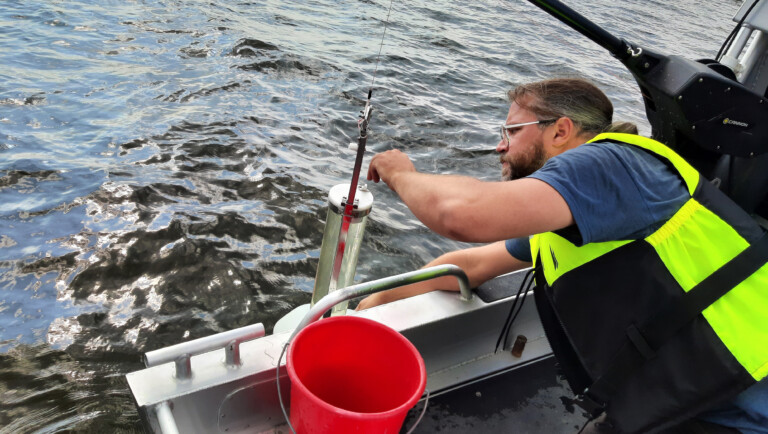Biodiversity
Companies have downplayed harmful effects of biocides

Researchers at Stockholm University have revealed that pesticide companies have withheld information on the harmful properties of their products. In a new study, researchers are now reviewing about 40 animal studies to see if companies are systematically avoiding disclosing risks.
Subscribe to Extrakt newsletter!
Läs mer
Stay up to date! Get the knowledge, ideas and new solutions for a sustainable society.
Personal data is stored only for the mailing of Extrakt newsletters and information related to Extrakt’s operations. You can cancel the newsletter at any time, which means you will no longer receive any emails from us
In the European Union, biocides can be used only after approval by the European Commission. The companies that manufacture the materials are required by law to submit data to the European Food Safety Authority (EFSA), but researchers from Stockholm University have identified shortcomings in this process.
Last summer they published a scientific paper revealing that nine animal studies, conducted by pesticide companies, have not been submitted to the authority.
Since EFSA became aware of these studies, the authority has changed some of its previous recommendations. The new information from the animal studies has contributed, among other things, to the banning of a previously authorised pesticide, Ethoprophos. For two other substances, Abamectin and Pymetrozine, EFSA has lowered the level of intake considered safe. Additional biocides are being re-examined in the light of this new information.
The researchers behind the revelation are Axel Mie and Christina Rudén, who work at the Department of Environmental Science at Stockholm University. They realised that some studies were missing when they compared the evidence at EFSA with the studies submitted to U.S. authorities. They are now continuing to review the scientific evidence provided by biocide manufacturers to see if there is a pattern of downplaying harmful effects.
“If companies deliberately choose to withhold information about risks, this is very problematic,” says Axel Mie.
Can impact childhood brains
Over the next three years, the researchers will systematically review about 40 studies in which biocide manufacturers investigate whether their products increase the risk of developmental neurotoxicity. The question is whether the substances contained in the biocides can have negative effects on the development of the brains of foetuses and children.

“We want to see if all data and analyses have been reported in a transparent, systematic and objective way in these studies,” says Christina Rudén.
She explains that it was previously impossible to conduct systematic reviews of the companies’ studies because they had been confidential. Thanks to a change in the law in 2021, all material can now be requested, which is exactly what Axel Mie and Christina Rudén have done.
“It has been a long process, and we still have not received everything, but the material we have access to is very interesting. I am not aware of anyone else investigating this. This material is truly unique,” says Rudén.
Authorities make these decisions – not companies
The Stockholm researchers will now review the 40 studies they have been able to access to see if they adhere to good scientific standards and if the results are reported correctly. Rudén explains that studies on biocides can often be interpreted in different ways. For example, there may be different views on how much evidence is needed to authorise or stop a substance. Sometimes it may also be necessary to weigh the benefits of a particular substance against the risks.
“It is extremely important that authorities make these assessments and not the companies. For that reason, we consider it crucial for authorities to have access to all studies and that their results are reliable,” she says.
Companies interpret the law different
Following revelation of the withholding of the nine animal studies, the European Parliament conducted a hearing involving the relevant chemical manufacturers in late summer 2023. During the hearing, several EU politicians and EFSA officials levelled strong criticism at the companies. They described failure to report the studies as “totally unacceptable” and a “scandal”.

Axel Mie, researcher at Stockholm University. Photo: Ulf Sirborn
Representatives from the targeted companies Syngenta and Bayer attended the hearing and denied the allegations. They say they have followed the rules and provided all relevant information to EFSA.
“They maintained that they make internal judgements about what data is relevant to submit, and I find that quite shocking,” says Rudén. “It seems that companies interpret the law differently from us and the authorities. We believe that the law is clear that it is the authorities who should judge what information is relevant.”
The EU is currently considering whether legislation needs to be rewritten to clarify the responsibilities of companies. But on one point, the legislation is already crystal clear, according to Mie: “The use of the substances should not have any adverse effects on human health.”
He and Christina Rudén hope that their research will help improve the EU’s assessment of new pesticides.
“The research we have done so far has already led to changes in decisions at the EU level,” says Rudén. “In the future we hope to further contribute to reducing exposure to hazardous substances. Our concern is that authorities do not currently base their decisions on a solid foundation of data. We want to make sure that we have a system that protects childhood brains.”








